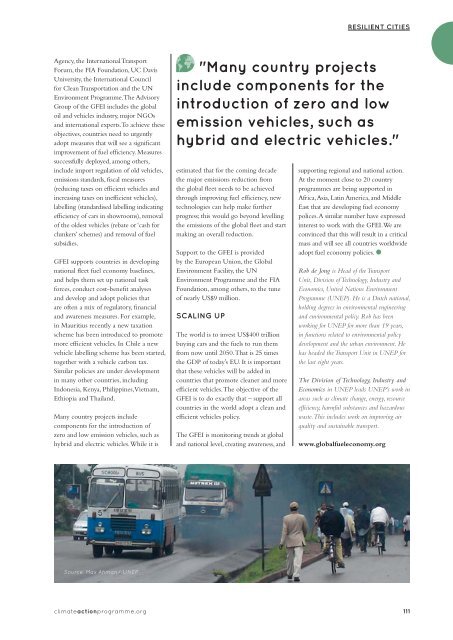Climate Action 2014-2015
Create successful ePaper yourself
Turn your PDF publications into a flip-book with our unique Google optimized e-Paper software.
RESILIENT CITIES<br />
Agency, the International Transport<br />
Forum, the FIA Foundation, UC Davis<br />
University, the International Council<br />
for Clean Transportation and the UN<br />
Environment Programme. The Advisory<br />
Group of the GFEI includes the global<br />
oil and vehicles industry, major NGOs<br />
and international experts. To achieve these<br />
objectives, countries need to urgently<br />
adopt measures that will see a significant<br />
improvement of fuel efficiency. Measures<br />
successfully deployed, among others,<br />
include import regulation of old vehicles,<br />
emissions standards, fiscal measures<br />
(reducing taxes on efficient vehicles and<br />
increasing taxes on inefficient vehicles),<br />
labelling (standardised labelling indicating<br />
efficiency of cars in showrooms), removal<br />
of the oldest vehicles (rebate or ‘cash for<br />
clunkers’ schemes) and removal of fuel<br />
subsidies.<br />
GFEI supports countries in developing<br />
national fleet fuel economy baselines,<br />
and helps them set up national task<br />
forces, conduct cost-benefit analyses<br />
and develop and adopt policies that<br />
are often a mix of regulatory, financial<br />
and awareness measures. For example,<br />
in Mauritius recently a new taxation<br />
scheme has been introduced to promote<br />
more efficient vehicles. In Chile a new<br />
vehicle labelling scheme has been started,<br />
together with a vehicle carbon tax.<br />
Similar policies are under development<br />
in many other countries, including<br />
Indonesia, Kenya, Philippines, Vietnam,<br />
Ethiopia and Thailand.<br />
Many country projects include<br />
components for the introduction of<br />
zero and low emission vehicles, such as<br />
hybrid and electric vehicles. While it is<br />
"Many country projects<br />
include components for the<br />
introduction of zero and low<br />
emission vehicles, such as<br />
hybrid and electric vehicles."<br />
estimated that for the coming decade<br />
the major emissions reduction from<br />
the global fleet needs to be achieved<br />
through improving fuel efficiency, new<br />
technologies can help make further<br />
progress; this would go beyond levelling<br />
the emissions of the global fleet and start<br />
making an overall reduction.<br />
Support to the GFEI is provided<br />
by the European Union, the Global<br />
Environment Facility, the UN<br />
Environment Programme and the FIA<br />
Foundation, among others, to the tune<br />
of nearly US$9 million.<br />
SCALING UP<br />
The world is to invest US$400 trillion<br />
buying cars and the fuels to run them<br />
from now until 2050. That is 25 times<br />
the GDP of today’s EU. It is important<br />
that these vehicles will be added in<br />
countries that promote cleaner and more<br />
efficient vehicles. The objective of the<br />
GFEI is to do exactly that – support all<br />
countries in the world adopt a clean and<br />
efficient vehicles policy.<br />
The GFEI is monitoring trends at global<br />
and national level, creating awareness, and<br />
supporting regional and national action.<br />
At the moment close to 20 country<br />
programmes are being supported in<br />
Africa, Asia, Latin America, and Middle<br />
East that are developing fuel economy<br />
polices. A similar number have expressed<br />
interest to work with the GFEI. We are<br />
convinced that this will result in a critical<br />
mass and will see all countries worldwide<br />
adopt fuel economy policies. <br />
Rob de Jong is Head of the Transport<br />
Unit, Division of Technology, Industry and<br />
Economics, United Nations Environment<br />
Programme (UNEP). He is a Dutch national,<br />
holding degrees in environmental engineering<br />
and environmental policy. Rob has been<br />
working for UNEP for more than 19 years,<br />
in functions related to environmental policy<br />
development and the urban environment. He<br />
has headed the Transport Unit in UNEP for<br />
the last eight years.<br />
The Division of Technology, Industry and<br />
Economics in UNEP leads UNEP’s work in<br />
areas such as climate change, energy, resource<br />
efficiency, harmful substances and hazardous<br />
waste. This includes work on improving air<br />
quality and sustainable transport.<br />
www.globalfueleconomy.org<br />
Source: Max Ahman / UNEP<br />
climateactionprogramme.org 111












